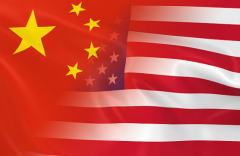Trump’s China-Sanctions Madness Imperils the Dollar
Earlier this month, US Treasury Secretary Steven Mnuchin threatened China, saying the US would “put additional sanctions on them and prevent them from accessing the US and international dollar system” if they don’t go along with the most recent round of sanctions slapped on North Korea. We argued that the threat may be meaningful, but it also might be empty.
In a recent article published on the Mises Wire, Ryan McMaken added another layer of analysis, arguing that if the US were to follow through on the threat, it would imperil the US dollar. McMaken’s reasoning dovetails with a point we’ve made more generally about Trump’s penchant for tariffs – that they will undermine the dollar. Of course, that’s good for gold.
![]()
US Treasury Secretary Steve Mnuchin warned the US will impose new sanctions on China if it doesn’t conform to UN sanctions on North Korea:
“If China doesn’t follow these sanctions, we will put additional sanctions on them and prevent them from accessing the U.S. and international dollar system, and that’s quite meaningful.”
In other words, the administration wants to sanction one of the US’s biggest trading partners, and the world’s second-largest economy.
China is the world’s third-largest recipient of Americans exports, behind only Canada and Mexico. China is the world’s largest source of imports for Americans, slightly ahead of both Mexico and Canada.
In 2016, Americans exported $169 billion in goods and services to China while importing $478 billion of goods and services. Every year, both consumers and producers benefit from the importation of Chinese electronics, machinery, food, footwear, and more.
Ratcheting up economic warfare with China could serve to cut off these avenues of trade and thus will only cost consumers and small business owners who currently benefit from lower-cost machinery, clothing, and more.
For the mercantilists in the Trump administration, of course, American consumers import “too much” from China anyway, and Americans and ought to be prohibited by the US government from purchasing what they want. The North Korea situation could serve as a convenient excuse for slapping prohibitions on American consumers in the name of “fair trade” while also serving as a foreign policy tool.
The last thing the US consumer needs is a trade war with China.
At this point, however, the US isn’t talking about cutting off trade in such a blunt manner.
As Mnuchin notes, the strategy here is to “prevent [the Chinese] from accessing the U.S. and international dollar system.” In practice, this would likely mean restricting access to the so-called SWIFT system which facilitates international transactions in dollars.
This idea is highly problematic in its own way. Were the Chinese to be cut off from the dollar, this would only create an enormous incentive for the Chinese to move away from the dollar into other currencies — including its own. China’s largest trading partners would likely follow China in this exodus. Moreover, China and Russia have already foreseen the possibility of SWIFT being “weaponized.”
As Jeff Thomas notes:
China, Russia and others have seen this day coming and have created their own SWIFT system, world cable network and world banking system. All that’s needed to kick it all into gear is a major international need to bypass SWIFT. The US government has just provided that need with this threat. There would certainly be teething pains in getting the new system running on a massive scale, but the sudden worldwide need would drive the implementation.
Moreover, China is a key trading partner for Germany, Russia, Australia, Japan. Brazil, and South Korea. Will these countries simply write off China as a trading partner because thy can’t settle accounts in dollars? It’s unlikely.
While this would not necessarily destroy the dollar, a movement away from the US dollar would greatly diminish the dollar’s standing as the world’s reserve currency. It would diminish the dollar’s role as the go-to currency, and this would, in turn, drive up borrowing costs — i.e. interest rates — for the US government. This would turn the US’s currently sustainable debt problem into an unsustainable one. Massive domestic budget cuts in the US would follow.
The fact is, as Foreign Policy noted last year, China is becoming “too big to sanction.” Todd Williamson writes on how the IMF has now added China’s currency, the renminbi (RMB), to its basket of four reserve currencies known as Special Drawing Rights. In doing so, Williamson notes, the IMF “may have delivered a severe blow to the strength of a key tool in the West’s geopolitical arsenal: financial sanctions.”
He continues:
The RMB is currently the fourth-most traded currency on the global market (behind the dollar, euro, and pound). It now holds the third highest percentage in the basket, at just under 11 percent, placing it ahead of the pound’s 8 percent (though far below the dollar, which holds more than 40 percent). The IMF’s decision to include the RMB is more than a symbolic sign of the currency’s liberalization: It’s also a big step toward the RMB’s regular usage outside of China. The SDR determines the mix of currencies in which the IMF lends out — a total of $112 billion in 2015 — and the RMB’s inclusion in this distribution mechanism will likely drive up the currency’s demand. The comfort level of the RMB’s usage in global transactions among central banks, sovereign wealth funds, and other massive financial institutions will rise with the currency’s greater accessibility.
In other words, slapping financial sanctions on the Chinese is nothing at all like doing the same to the Iranians or the Venezuelans. The Chinese economy and the Chinese currency are already huge global players which huge trading partners.
Now, as Thomas notes, if the US forces China away from the dollar will not be without pain. If it were painless, the Chinese state would have abandoned the dollar already.
China Is Highly Motivated to Go Its Own Way on North Korea
Should the US force the Chinese regime’s hand, the regime will be highly motivated to stay the course on North Korea, in spite of the potential for economic disarray.
China already feels itself surrounded by Western client states, including Japan, South Korea, Taiwan, and the Philippines. The Chinese state is not going to abandon its buffer state in North Korea. Were North Korea to be absorbed into a Greater Korea on American terms, this would be seen as a disaster by the Chinese, since it would place US forces right on a Chinese land border, just across the Yalu River.
To get a sense of why the Chinese will not cave to US attempts at regime change in North Korea, imagine how the US would behave if China threatened the US with sanctions — unless the US permitted Chinese troops on the south bank of the Rio Grande.
Add in the fact that the Chinese state is not subject to elections, and we can see the political will to carry on with de-dollarization in the face of US sanctions would be significant indeed.
Another likely outcome of financial sanctions would be to encourage the Chinese to dump their holdings of US debt. China currently holds seven percent of all US bonds. Were the Chinese to dump these holdings, it will become far more difficult for the US and its central bank to continue paying rock-bottom interest rates on its 20-trillion-dollar debt.
If the US wants to really continue with this sanctions game, it need also be prepared to face the reality that its not 1989, and that the world may not be willing to treat dollars and US sanctions in the way the US expects it to. The likely response will only be the latest evidence that the US “unipolar moment” is over.
Ryan McMaken (@ryanmcmaken) is the editor of Mises Wire and The Austrian. Ryan has degrees in economics and political science from the University of Colorado, and was the economist for the Colorado Division of Housing from 2009 to 2014. He is the author of Commie Cowboys: The Bourgeoisie and the Nation-State in the Western Genre.
Get Peter Schiff’s most important Gold headlines once per week – click here – for a free subscription to his exclusive weekly email updates.
Interested in learning how to buy gold and buy silver?
Call 1-888-GOLD-160 and speak with a Precious Metals Specialist today!





 Whenever an election year rolls around, domestic manufacturing becomes a more central theme of discussion. Candidates from both sides, who seem to disagree on almost everything else, never waver in their commitment to auto manufacturers in Detroit and the steel industry. Republicans and Democrats never forget to remind the American public that they will try […]
Whenever an election year rolls around, domestic manufacturing becomes a more central theme of discussion. Candidates from both sides, who seem to disagree on almost everything else, never waver in their commitment to auto manufacturers in Detroit and the steel industry. Republicans and Democrats never forget to remind the American public that they will try […] The wizards at the Fed and US Treasury have been forced to acknowledge that their “transitory,” inflation is, in fact, quite “sticky.” And with the inflation elephant now acknowledged by the circus of high finance, Treasury yields keep inching up, recently reaching 4.7% — the highest since November. The Fed is stuck: It needs to raise interest rates to tame inflation and […]
The wizards at the Fed and US Treasury have been forced to acknowledge that their “transitory,” inflation is, in fact, quite “sticky.” And with the inflation elephant now acknowledged by the circus of high finance, Treasury yields keep inching up, recently reaching 4.7% — the highest since November. The Fed is stuck: It needs to raise interest rates to tame inflation and […] The solution to a problem shouldn’t make the problem worse. But apparently, California’s policy makers missed that memo. On April 1st, the state instituted a $20 minimum wage for fast food workers, the highest in the US. With California’s absurdly high cost of living, the policy appeared to make life more manageable for low-income residents. Unfortunately, as the adage goes, “If it sounds too […]
The solution to a problem shouldn’t make the problem worse. But apparently, California’s policy makers missed that memo. On April 1st, the state instituted a $20 minimum wage for fast food workers, the highest in the US. With California’s absurdly high cost of living, the policy appeared to make life more manageable for low-income residents. Unfortunately, as the adage goes, “If it sounds too […] The monetary battle of the 20th century was gold vs. fiat. But the monetary battle of the 21st century will be gold vs. bitcoin. With Wall Street jumping into the game with bitcoin ETFs, a bitcoin halving recently splitting the block reward for miners in half, and both gold and bitcoin hovering near their all-time highs, it’s a great time for […]
The monetary battle of the 20th century was gold vs. fiat. But the monetary battle of the 21st century will be gold vs. bitcoin. With Wall Street jumping into the game with bitcoin ETFs, a bitcoin halving recently splitting the block reward for miners in half, and both gold and bitcoin hovering near their all-time highs, it’s a great time for […] What is Nvidia? If you’re a committed gamer the question may sound like nonsense. Nvidia, which was founded in 1993, is a tech company that makes GPUs and other products. It originally specialized in making products for the video game industry, that assisted in 3D rendering. If you were a committed gamer, you probably owned their products. If you weren’t, you might not have heard of them.
What is Nvidia? If you’re a committed gamer the question may sound like nonsense. Nvidia, which was founded in 1993, is a tech company that makes GPUs and other products. It originally specialized in making products for the video game industry, that assisted in 3D rendering. If you were a committed gamer, you probably owned their products. If you weren’t, you might not have heard of them.